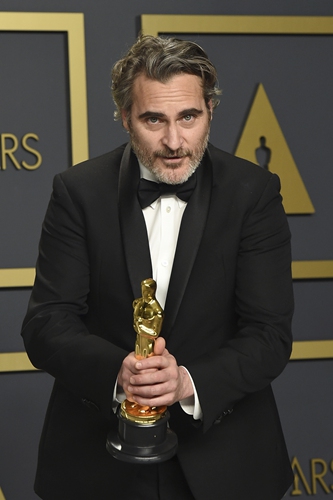HOME >> ARTS
Phoenix: Hollywood’s anti-hero seals stardom with ‘Joker’
Source:AFP Published: 2020/2/10 17:33:07

Joaquin Phoenix Photo: IC
Enigmatic A-lister Joaquin Phoenix won the best actor Oscar on Sunday for his anti-hero role in dark comic book tale Joker, capping an unpredictable and often uncomfortable rise to Hollywood stardom.His first Academy Award follows months of controversy over the arthouse origin story about Batman's nemesis, which stoked fears of inciting violence even as it hoarded awards and nominations.
"I've been a scoundrel in my life," an emotional Phoenix told the audience.
"But so many of you in this room have given me a second chance and I think that's when we're at our best, when we support each other - not when we cancel each other out for past mistakes, but when we help each other to grow," he said.
The 45-year-old Phoenix paid tribute to his late brother River, who died of a drug overdose in 1993 at age 23.
"Run to the rescue with love and peace will follow," Phoenix said, quoting his brother.
After a string of television and film roles in his youth, the actor burst into Tinseltown with bad boy roles including an abusive boyfriend in Oliver Stone's crime flick U Turn (1997) and a sex shop manager in 1999 thriller 8MM.
The star-making run culminated in his portrayal of the evil Roman emperor Commodus tormenting Russell Crowe in Gladiator (2000), which earned Phoenix his first Oscar nomination.
Phoenix changed tack - and learned to sing and play guitar - to emulate Johnny Cash in 2005's Walk the Line, earning his second nod from Academy voters.
For that film, the actor - a strict vegetarian - insisted that his clothes be synthetic and not made of leather, like those worn by the country legend.
Five years later, Phoenix memorably threw critics and fans a curveball by making I'm Still Here, a fake documentary following his supposed mental breakdown and desire to become a rapper.
A third Oscar nomination came and went in 2013 for the Scientology-inspired The Master, which saw Phoenix play an alcoholic veteran who becomes a disciple of a nascent 1950s cult called The Cause.
On Sunday, he was fourth time lucky.
Losing brother River
Phoenix - born Joaquin Rafael Bottom in Puerto Rico - grew up in a hippie family that followed the Children of God sect, which was dogged by sex abuse claims.
His family, which included five children, left the notorious movement in Venezuela when Joaquin was 3, and roamed North America before settling in Los Angeles.
There, his parents hired an agent to launch their children's careers.
Joaquin and his older brother River landed television roles in the early 1980s.
In 1986, Joaquin - then known as Leaf - made his feature debut in the science-fiction film SpaceCamp. Three years later, he appeared in Ron Howard's comedy Parenthood.
But his career, at least at first, was overshadowed by his brother's success.
River Phoenix became a child star with roles in such films as the 1986 drama Stand By Me before playing the young Indiana Jones in Indiana Jones and the Last Crusade (1989).
Joaquin took a brief break from acting after River's death from a drug overdose in 1993 - when a recording of Joaquin's desperate call for an ambulance was sold to the media.
But Joaquin - who recently said he was "indebted" to his brother for telling him to become an actor - landed a key role two years later in To Die For, alongside Nicole Kidman.
Extreme weight loss
In addition to snatching the best actor Oscar, Phoenix also won this year's Golden Globe award for best actor in a drama for Joker, which won the Venice film festival's top prize.
He has called the role, for which he shed more than 22 kilograms to bring to life Arthur Fleck's gaunt physique, "one of the greatest experiences of my career."
"It seemed limitless, in how you could interpret the character and what you could do with it - it didn't feel like there were any rules," said Phoenix.
Hailed as "sensational" and "unnerving" by some critics, the performance raised fears for others that its depiction of mental illness and violence could prove "incendiary."
Already known for his often surly and spiky interviews, Phoenix was reluctant to tackle the concern while promoting the film, famously walking out of the room when one journalist raised the topic.
Newspaper headline: Always a ‘scoundrel’